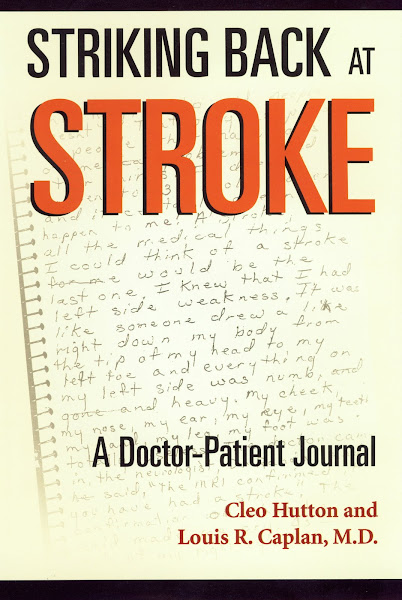By
Cleo Hutton
Author/Speaker/Stroke Hero/Licensed Practical Nurse/Advocate
Cleo Hutton, from Minnesota, is a well-respected author, speaker, nurse, stroke survivor, and advocate for stroke awareness and recovery.
Hutton lectures around the world using her heart, humor, and experience to deliver a message of hope and healing.
Stroke Facts
Leading cause of adult disability
150,000 deaths per year
750,000 new strokes per year
4.7 million Stroke survivors
What is the impact of Stroke?
• On average, someone suffers a stroke every 45 seconds
• Every 3.3 minutes, someone dies of a stroke
What Causes a Stroke?
• Blockage from hardening of the arteries
• Floating blood clot
• Ruptured vessel
Types of Strokes:
Stroke Facts
Leading cause of adult disability
150,000 deaths per year
750,000 new strokes per year
4.7 million Stroke survivors
What is the impact of Stroke?
• On average, someone suffers a stroke every 45 seconds
• Every 3.3 minutes, someone dies of a stroke
What Causes a Stroke?
• Blockage from hardening of the arteries
• Floating blood clot
• Ruptured vessel
Types of Strokes:
Ischemic or Occlusive-occurs when a blood vessel bringing oxygen and nutrients to part of the brain becomes clogged
Hemorrhagic- blood vessel bursts or bleed in brain
A STROKE occurs when a blood vessel bringing oxygen and nutrients to part of the BRAIN becomes clogged or bursts.
Stroke Warning Signs
• Sudden weakness or numbness of the face, arm or leg, especially on one side of the body
• Sudden confusion, trouble speaking
or understanding
• Sudden trouble seeing in one or both eyes
• Sudden trouble walking, dizziness, loss of balance or coordination
• Sudden, severe headaches with no known cause (for hemorrhagic stroke)
Brain Attack (Stroke) is an emergency!
Read about Stroke’s impact, care, and recovery in:
Striking Back at Stroke: A Doctor-Patient Journal by Cleo Hutton & Louis R. Caplan, MD (Dana Press, Washington, DC, May 2003)
After a Stroke: 300 Tips for Making Life Easier by Cleo Hutton
(Demos Medical Publishing, New York, NY, June 2005)
“...Hutton discusses adaptive equipment, emotional liability, and the impact on family. Most of all, however, she talks about getting through the day and night—pillow arrangement, television, naps, and how to play cards and slice vegetables safely. Her book should reside on the shelves of public libraries, consumer health libraries, and private collections of physicians, nurses, and counselors; highly recommended.”-Library Journal
“…Hutton's useful advice will find many a hopeful reader …Hutton wants stroke survivors to get back into the daily routine, take on an acceptable level of independence, keep and good sense of humor and never to forget entertainment …And most importantly, Hutton inspires hope, a vital soothing force in the road to recovery.”- Kirkus Reports



3 comments:
I just found your blog and mentioned in my own, http://stroke-of-faith.blogspot.com. I, too, am a stroke survivor.
Hi Cleo,
In honor of Stroke Awareness Month, I just threw a little link love your way:
http://www.caring.com/blogs/caring-currents/link-love-for-stroke-awareness-month
Stephanie Trelogan
Senior Editor, Caring.com
Heart Disease, Stroke, and Depression
Legendary TV Personality Mark McEwen has a new book out on life after stroke. In November 2005, Mark suffered a minor stroke while visiting relatives in Baltimore. The hospital misdiagnosed it as the flu and discharged him. A few days later, on a flight back to his home in Orlando, McEwen suffered a massive stroke during the plane’s descent. It almost killed him, and it might have been prevented.
McEwen, a talented and witty public speaker, suddenly found himself stuck in a hospital, unable to talk, swallow, or move half his body. In his new book, CHANGE IN THE WEATHER: Life After Stroke, McEwen’s writes candidly everything that happened next, in an intimate chronicle of inspiring perseverance.
Today, over two years later, McEwen has returned to much of his normal life—walking, talking, driving, and even going back on TV. With CHANGE IN THE WEATHER, McEwen has decided to share his story because “I want stroke survivors to know that they’re not alone. There is indeed life after stroke, and even in the most extreme cases, patients can expect to recover pieces of their old lives and graft them onto whatever new experiences lay in wait.”
In addition to discussing what we need to know about stroke and its warning signs, he can discuss his illustrious career and how stroke humbled him.
For more information on the book visit: http://www.markmcewen.com/
Post a Comment